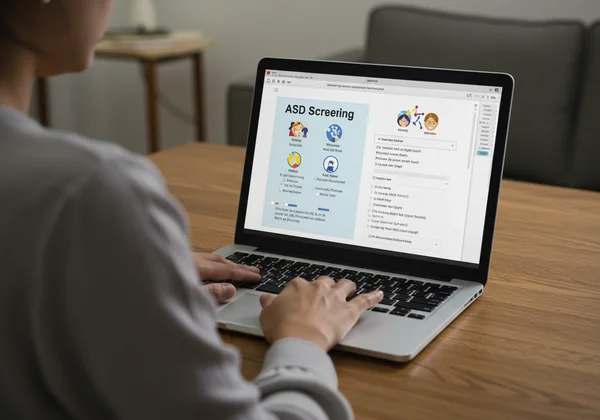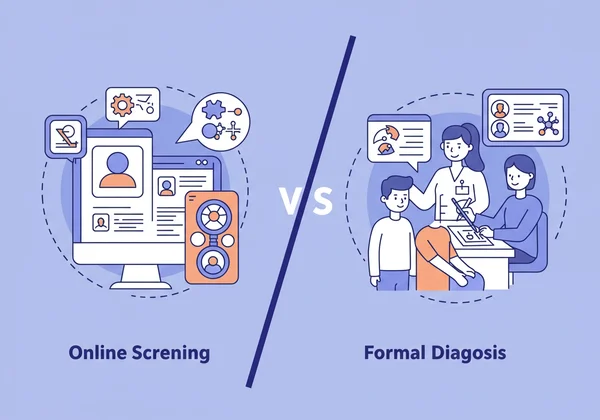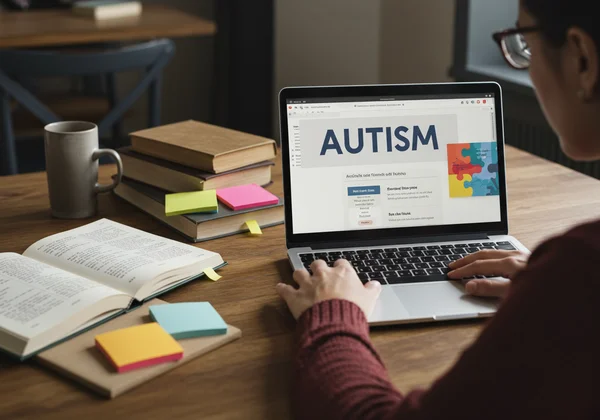What to Do After an ASD Test: Understanding Your Results and Next Steps
July 27, 2025 | By Eleanor Sutton
You've just completed an online ASD screening and are looking at your results. This moment can bring a mix of emotions—curiosity, validation, or even a new set of questions. If you're wondering, what to do after an ASD test, you are not alone. This is a natural and important question. This guide is designed to help you understand your preliminary results, outline clear, actionable next steps, and connect you with the right support for your unique journey. Remember, this is the beginning of understanding, not the final word.
The path to self-discovery is personal. If you haven't taken a screening yet or wish to re-explore the questions, taking a free online ASD test is a valuable, private, and accessible first step. It provides initial insights that can empower you to make informed decisions about what comes next.

Understanding Your Online ASD Screening Results
Receiving results from an online ASD screening test is a significant moment. It’s crucial to place these results in the proper context to use them effectively. They are not a conclusion but a starting point—a valuable piece of information designed to guide your self-exploration or your understanding of a loved one's needs.
What Your ASD Test Scores Mean
Your score from a preliminary ASD test reflects the degree to which your responses align with traits commonly associated with Autism Spectrum Disorder. The meaning of your asd test scores comes from connecting them to your lived experiences. A higher score suggests that you or your child may exhibit a number of these characteristics related to social communication, sensory sensitivities, or repetitive behaviors. Think of it as a signpost pointing toward areas for further exploration, not a destination. Does this information validate feelings or observations you've had for a long time? This is a key part of the process.
Screening vs. Formal Diagnosis: Key Differences
This is the most critical distinction to understand. An online screening tool is an informational resource. It's designed to identify potential traits and suggest whether a further, more detailed evaluation is warranted. It is a preliminary step, much like a health questionnaire you might fill out before a doctor's appointment.
A formal diagnosis, on the other hand, is a comprehensive professional evaluation conducted by a qualified healthcare provider, such as a clinical psychologist, psychiatrist, or developmental pediatrician. This process involves in-depth interviews, behavioral observations, and standardized assessments. Only a qualified professional can provide a formal diagnosis, which is necessary for accessing certain support services, therapies, and accommodations.

The Role of an Online ASD Screening
The journey toward understanding autism can feel overwhelming. Many people—whether they are adults exploring their own identity or parents concerned about their child—don't know where to begin. An online asd screening provides a safe, user-friendly, and informative first step. It offers a private space to explore possibilities without immediate pressure and can provide the confidence and language needed to start a conversation with loved ones or a professional. The goal is to make self-exploration more accessible, empowering you to enrich your life with understanding.
5 Actionable Next Steps After Your ASD Test
With your preliminary asd test results in hand, you have several paths forward. These steps often work best together to help you build a more complete picture, moving from initial insights to a deeper, more personalized understanding.
1. Reflect on Your Lived Experiences
Take some time to sit with the results. How do they relate to your daily life? Consider specific examples from your past or present. Think about social interactions, communication styles, sensory experiences (like sensitivity to sounds or textures), and your deep interests or hobbies. Journaling can be a powerful tool here. Write down your thoughts about the autistic traits identified in the screening. This self-reflection is an invaluable part of the self-discovery journey and will be immensely helpful if you decide to seek a professional assessment.
2. Educate Yourself with Reputable Resources
Your learning journey has just begun. Continue to educate yourself using reliable sources. Websites like the Autistic Self Advocacy Network (ASAN) and government bodies like the CDC provide trustworthy information. Reading books by autistic authors and following autistic creators on social media can also provide invaluable firsthand perspectives. The more you learn, the more effectively you can advocate for yourself or your child.

3. Get Deeper, Personalized Insights
While a basic score provides a general overview, a more detailed analysis can offer incredible value. At AsdTest.org, we offer an innovative, optional AI Personalized Report that goes beyond the numbers. By providing additional, optional context about your experiences, you can [unlock a detailed analysis of your results]. This report can help you understand potential strengths, identify specific challenges, and see how these traits might impact different areas of your life, from work to relationships. It also offers a personalized action plan with tangible ideas for support strategies.
4. Consider Seeking a Professional Autism Diagnosis
If your screening results indicate a strong likelihood of ASD and your self-reflection resonates with this, seeking an autism diagnosis from a professional is a logical next step. This is especially important if you or your child are facing significant challenges that would benefit from formal support, such as workplace accommodations, an Individualized Education Program (IEP) at school, or therapies like speech or occupational therapy.
To find a qualified professional, you can:
- Ask your primary care physician or your child's pediatrician for a referral.
- Contact your insurance provider for a list of in-network specialists.
- Search for local autism centers or developmental specialists online.
Prepare for the appointment by bringing your online screening results and any notes from your self-reflection. This information provides a valuable starting point for the professional.
5. Connect with the Autism Community
Finding your people can be life-changing. You are not alone on this journey. The autism community is diverse, welcoming, and active, both online and offline. Look for Facebook groups, Reddit communities (like r/autism or r/AutismInWomen), or local meetup groups for autistic individuals or parents of autistic children. These support networks offer a space to share experiences, ask questions, and learn from others who have walked a similar path. Hearing from people who "get it" can reduce feelings of isolation and provide immense comfort and empowerment.

Your Results Are a Starting Point, Not a Label
Receiving your online ASD test results is a pivotal moment. It’s an invitation to understand yourself or your loved one on a deeper level. Remember that this is a spectrum, and every individual's experience is unique and valid. Your results are not a label but a lens—a new way of seeing and interpreting experiences.
This journey is about empowerment. Use these initial insights as a catalyst for reflection, further learning, and connection. Whether your next step is seeking a professional diagnosis, connecting with the community, or simply learning more, you are moving toward a richer, more authentic life. Begin your journey of self-discovery today with knowledge and confidence.
Frequently Asked Questions About Post-ASD Test Steps
What should I do immediately after my online ASD test?
After receiving your results, the best first steps are to take a moment to reflect on how they align with your personal experiences. Then, learn more about the crucial distinction between an informational screening and a formal diagnosis, and use our guide to consider which next steps, like seeking a professional assessment, are right for you.
Can an online ASD test provide a formal diagnosis?
No, an online test cannot provide a formal diagnosis. It is a preliminary screening tool designed to offer initial insights and indicate whether a professional evaluation may be beneficial. Only a qualified healthcare professional can provide a formal diagnosis.
Are my online ASD test results confidential?
Yes. At AsdTest.org, we are committed to your privacy. Your test results and any personal information you share are treated with strict confidentiality and are not shared. Our platform provides a secure environment for self-exploration.
What is the primary difference between a screening and a diagnosis?
A screening is a brief, informational tool that identifies potential traits. A diagnosis is a comprehensive, in-depth evaluation conducted by a clinical professional to determine if an individual meets the clinical criteria for Autism Spectrum Disorder.
Is AsdTest.org's online screening reliable for initial insights?
Yes, our screening is carefully designed based on established principles from scientifically validated tools to provide reliable and valuable initial insights. It serves as a trustworthy starting point for anyone wanting to explore autistic traits. You can take our free online ASD screening at any time.
Where can I find reputable support resources for autism?
Reputable resources include national organizations like the Autistic Self Advocacy Network (ASAN), government health websites like the CDC, and local autism centers. Online communities and support groups led by autistic individuals are also invaluable sources of peer support and lived experience.